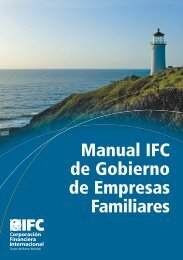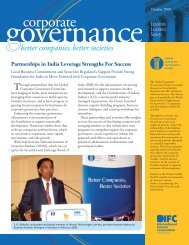SME Finance Policy Guide
SME Finance Policy Guide
SME Finance Policy Guide
You also want an ePaper? Increase the reach of your titles
YUMPU automatically turns print PDFs into web optimized ePapers that Google loves.
64 GLOBAL PARTNERSHIP FOR FINANCIAL INCLUSION<br />
Example: Start and Improve Your<br />
Business – ILO Helps Small Businesses<br />
Reach Their Potential<br />
Example: Turk Economici Bank – A First<br />
Mover in Providing Non-financial<br />
Services to <strong>SME</strong>s<br />
Since 1991, the International Labour Organization’s (ILO)<br />
Start and Improve Your Business (SIYB) program has<br />
been helping would-be entrepreneurs launch and<br />
expand their businesses. The SIYB program is aimed at<br />
creating more and better employment opportunities in<br />
emerging markets through the development of the<br />
micro and small enterprise (MSE) sector.<br />
Like IFC’s Business Edge, SIYB strengthens – rather than<br />
displaces – the local market for capacity-building services.<br />
It relies on a network of qualified partner organizations<br />
(POs) to deliver business management training<br />
across more than 80 countries. The ILO has implemented<br />
a “train the trainer” model that ensures POs are<br />
qualified to provide training to MSEs.<br />
Using appropriate adult training methodologies, SIYB<br />
takes enterprises through the entire process of starting<br />
and managing a business, beginning with a course on<br />
how to develop an idea for a business. The program<br />
continues with “Start Your Business,” an interactive<br />
module that walks entrepreneurs through the development<br />
of a feasible business plan. The third course,<br />
“Improve Your Business,” helps firms establish basic<br />
management systems, including financial management,<br />
costing and marketing. The final course, “Expand Your<br />
Business,” is aimed at MSEs that are growth oriented. It<br />
relies on training and other mechanisms to help businesses<br />
develop and launch a growth strategy.<br />
Turk Economici Bank (TEB) was among the first<br />
banks in Turkey to recognize that providing capacitybuilding<br />
support to <strong>SME</strong>s could have enormous<br />
potential in building a client base of healthy businesses,<br />
increasing customer loyalty, and decreasing<br />
credit risk in the <strong>SME</strong> sector. In 2005, TEB began<br />
offering training services through its <strong>SME</strong> Academy.<br />
The primary goal of training is to build <strong>SME</strong> competitiveness<br />
and strategic planning capabilities. It also<br />
helps <strong>SME</strong>s take a market-centric approach to their<br />
businesses, giving them the tools to identify and<br />
respond to new opportunities for products and services.<br />
In 2008, TEB began to complement its “lowtouch”<br />
training with “high-touch” one-on-one<br />
management consulting delivered through a cadre of<br />
trained relationship managers.<br />
TEB has emerged as a leader among Turkish banks<br />
in experimenting with innovative non-financial<br />
approaches to <strong>SME</strong> capacity building. Its capacitybuilding<br />
support has resulted in a decrease in loan<br />
delinquency rates in its <strong>SME</strong> portfolio, in addition to<br />
new client acquisition and greater customer loyalty.<br />
Driven by its success in Turkey, BNP Paribas (one of<br />
TEB’s largest shareholders) has replicated aspects<br />
of this non-financial business model in other emerging<br />
markets.<br />
Source: Turk Economici Bank, 2011<br />
Source: International Labour Organization, 2010 (www.ilo.org)<br />
models that can be delivered by the private sector in a<br />
programmatic way on a regional or global basis.<br />
Holistic Approach<br />
The hurdles facing <strong>SME</strong>s are complex and inter-related<br />
and therefore will not be solved by one type of intervention.<br />
The impact of access to finance can be amplified<br />
through greater managerial bandwidth. A private<br />
sector example of a holistic approach is South Africa’s<br />
Business Partners, 81<br />
an investment fund that targets<br />
small entrepreneurs in Africa. Its strategy hinges on<br />
assessing the technical assistance needs of potential clients<br />
and making their acceptance of an integrated program<br />
of support a condition of investment. In keeping<br />
with the principle of intermediary development, services<br />
are delivered by local partners, and not directly<br />
81 Making Big Things Happen for Small Businesses: Annual Report 2011, Business Partners. Retrieved July 7, 2011 from http://www.<br />
businesspartners.co.za/Finresults/AR2011.pdf.



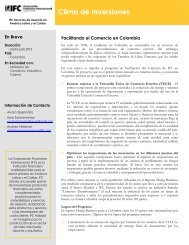
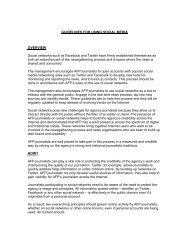
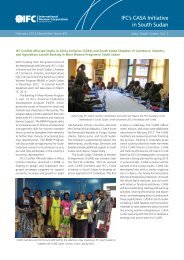
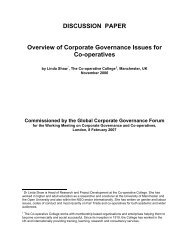
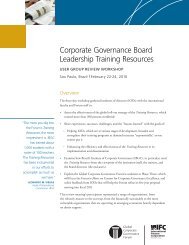

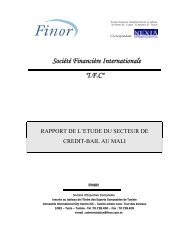
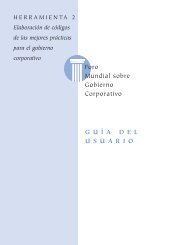
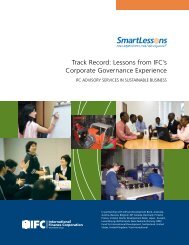
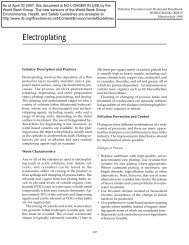
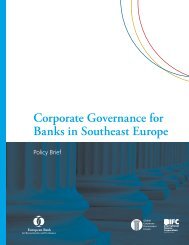
![Print a two-page fact sheet on this project [PDF] - IFC](https://img.yumpu.com/43449799/1/190x245/print-a-two-page-fact-sheet-on-this-project-pdf-ifc.jpg?quality=85)
